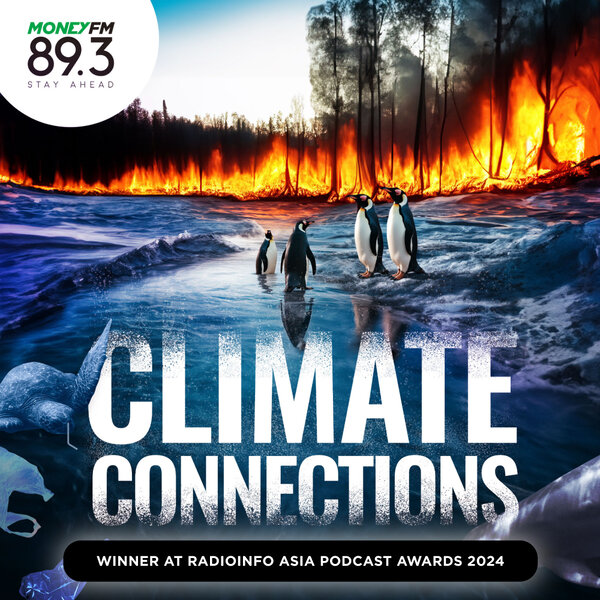
Climate Connections
About
A special segment on Money FM 89.3's Breakfast Show that brings you on an exclusive audio journey to the ends of the world, covering in-depth environment, natural history and climate change stories that intertwine with human life on Earth.
OCT 11, 2024
11/10/24 - Climate Connections: Farmers eye carbon credits as a way of regenerating revenue and nature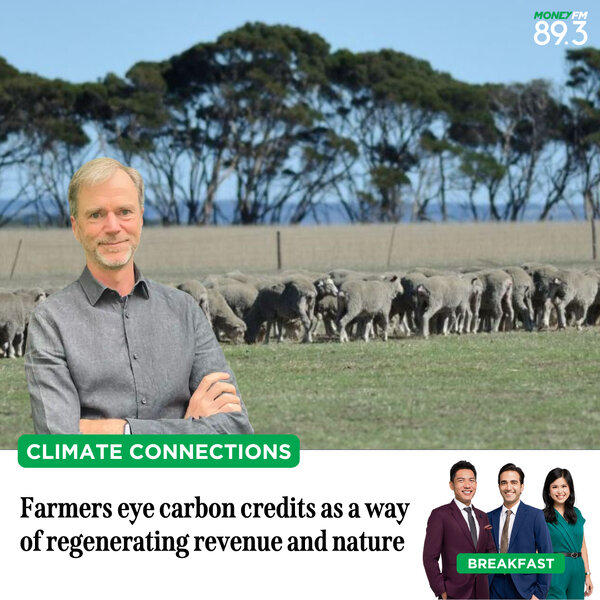
Nature is our life support system, but right now, it’s in trouble. WWF’s latest Living Planet Report reveals that the average size of wildlife populations have declined by a staggering 73% since 1970, providing a stark warning “that the world is fast approaching dangerous tipping points”.
Habitat loss and degradation, driven primarily by our food system is the most reported threat to wildlife populations, followed by overexploitation, invasive species and disease.
With Australia’s role as a regional food supplier growing in importance as global food demand surges, an Australian farmer-owned mutual - Regen Farmers Mutual - is working hard at giving landowners greater access to the growing environmental goods and services markets as the world transitions to net zero.
More than 80 farmers, conservationists and landcarers behind Regen Farmers Mutual have designed a new brokerage model to reduce transaction costs and enable farmers to aggregate their market power to sell environmental services. They are raising $51 million from mining and energy players to fund a series of regenerative farming projects. The mutual has agreed to $100 per unit for the first 1,000 of 18,500 available carbon credits across 750 hectares of land.
On this episode of Climate Connections, Rohan Clarke, Co-director, Regen Farmers Mutual shares how they’re tapping on carbon markets and regenerative farming to preserve their lands.
Feature produced and edited by: Yeo Kai Ting (ykaiting@sph.com.sg)
Voiced by: Emaad Akhtar
Photo credits: Regen Farmers Mutual
Music credits: pixabay & its talented community of contributors
|
|
|
|
12:30
|
OCT 3, 2024
03/10/24 - Climate Connections: A third of African apes under threat as demand surges for critical minerals needed for clean energy technology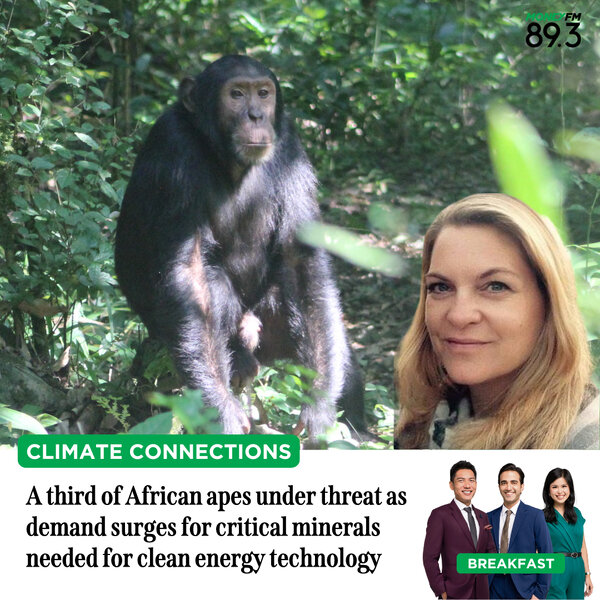
About 180,000 chimpanzees, gorillas and bonobos could be directly or indirectly threatened by current and future mining projects for these transition metals, particularly in West Africa.
With the world focusing its attention on clean energy transition, a boom in African mining activity is expected as critical minerals such as copper, lithium, nickel and cobalt are needed for clean energy technologies such as wind turbines and electric cars. This surge in demand is driving destruction of tropical rainforests which are critical habitats for Africa’s great apes.
In a recent study, researcher Jessica Junker and a team of scientists found that the overlap between mining exploration and preparation areas and important ape habitats was particularly high in West Africa, especially Guinea.
On this episode of Climate Connections, lead author of the study, Jessica Junker, Researcher, Re:wild shares her insights on the delicate balance.
Feature produced and edited by: Yeo Kai Ting (ykaiting@sph.com.sg)
Voiced by: Emaad Akhtar
Photo credits: Re:wild
Music credits: pixabay & its talented community of contributors
|
|
|
|
15:17
|
SEP 27, 2024
27/09/24 - Climate Connections: Australia-Asia Power Link Project awaiting Singapore's approval. Are cross-border collaborations the most important key to renewable energy adoption?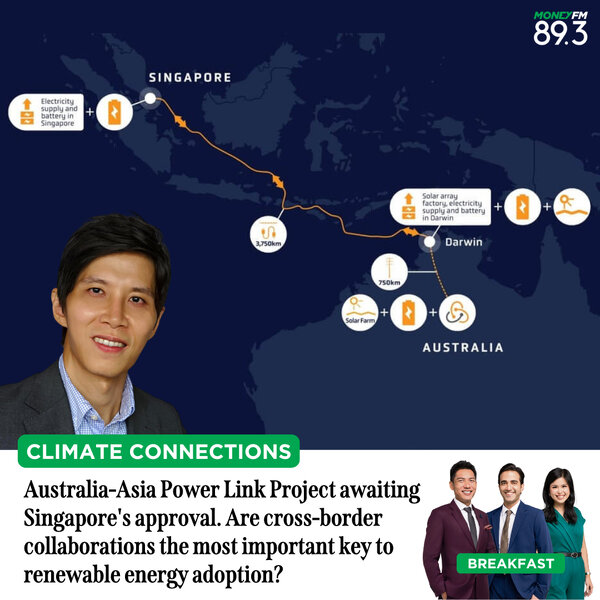
Solar power saw a boom in 2023, making it the fastest growing source of electricity generation for the 19th year running. This comes as countries around the world push for a transition towards greener sources of energy.
Australia has given the go-ahead for a A$20 billion (US$13.5 billion) solar project that plans to ship energy from a giant solar farm in the country's north to Singapore through a 4,300 km undersea cable. The approval comes with strict conditions to protect nature and the project must avoid the habitat of greater bilby, which are small rabbit-like marsupials with long floppy ears.
A final investment decision is expected in 2027. If eventually approved, the project aims to deliver up to 6 gigawatts of green electricity to large-scale industrial customers in Darwin, the capital city of Australia's Northern Territory, and in Singapore.
But how challenging are such large scale energy projects and are cross-border collaborations the most important key to renewable energy adoption?
On this episode of Climate Connections, Hanwei Wu, Editorial Director, OPIS shares his insights. He heads the Asia-Pacific team in producing price assessments and proprietary data for the oil, petrochemical, renewables and carbon markets.
Feature produced and edited by: Yeo Kai Ting (ykaiting@sph.com.sg)
Voiced by: Audrey Siek
Photo credits: SunCable
Music credits: pixabay & its talented community of contributors
|
|
|
|
13:54
|
SEP 20, 2024
20/09/24 - Climate Connections: Monkey Business - How Singapore's "Jane Goodall" is pushing for langur conservation in SEA through the first genus action plan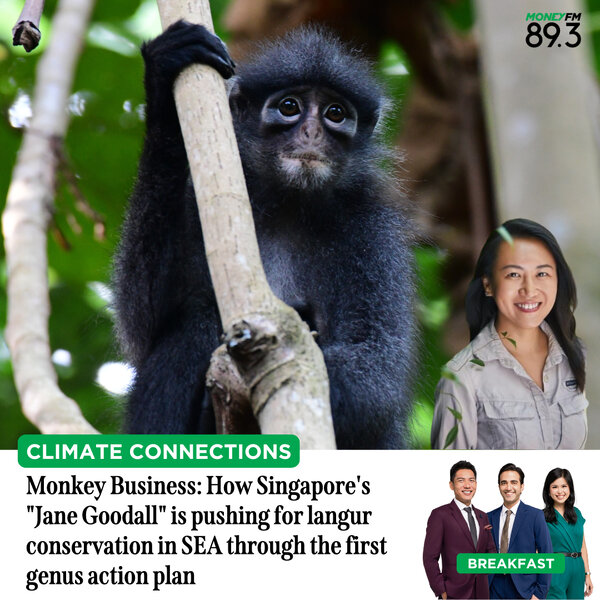
Despite being highly threatened, only a few langur populations have been studied in detail, owing to their elusive nature, arboreality and the challenging terrains where they inhabit. As a result, conservation of these species has been challenging.
Over 85 per cent of Asian langurs are threatened with extinction, making them one of the continent’s most threatened primate groups.
A new landmark Asian langurs (Presbytis) Conservation Action Plan 2024-2034, combining the efforts of international primate experts and conservationists, has just been launched, in a bid to galvanise conservation for Asian langurs across Southeast Asia.
On this episode of Climate Connections, lead of the initiative, Dr Andie Ang, Head, Primate Conservation & Singapore Programmes, Mandai Nature shares her first-hand insights on putting together the conservation plan and her experience out in the field.
Feature produced and edited by: Yeo Kai Ting (ykaiting@sph.com.sg)
Voiced by: Emaad Akhtar
Photo credits: Andie Ang
Music/Sound credits: pixabay & its talented community of contributors, Ecology Asia| Sophia Sak Baker
|
|
|
|
13:32
|
SEP 13, 2024
13/09/24 - Climate Connections: Turning trash to cash - How one business is recycling spent catalytic converters into precious metals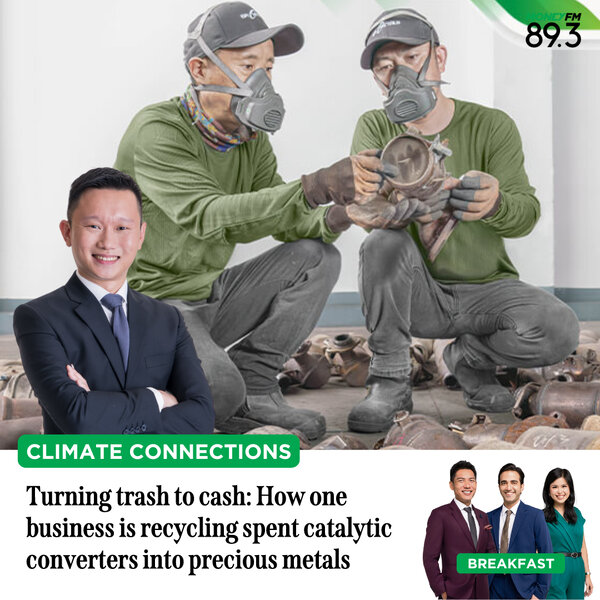
Platinum group metals (PGM) - a group of precious metals - such as platinum, palladium and rhodium, are traditionally recovered through underground and open pit mining within a linear economy, where the ore is mined, transformed into products and then disposed of as waste at the end of their lives. These metals are often used in catalytic converters for cars, buses, trucks, and other industrial processes.
However, the process of mining for these precious metals could directly or indirectly lead to environmental impacts including deforestation, water pollution, and habitat destruction.
With the aim of creating a circular economy while fulfilling the high demand for these finite precious resources in a sustainable way - one company called BR Metals is recovering these metals from metal scraps and reintroducing them into the supply chain.
On this episode of Climate Connections, Frank Chen, Founder & Managing Director, BR Metals shares more about how his company is recovering precious metals from car scraps and his latest ventures into the gold and silver space. BR Metals was also crowned Champion in the Business For Good category at this year’s Brands for Good Awards.
Feature produced and edited by: Yeo Kai Ting (ykaiting@sph.com.sg)
Voiced by: Audrey Siek
Photo credits: BR Metals
Music credits: pixabay & its talented community of contributors
|
|
|
|
09:10
|
SEP 6, 2024
06/09/24 - Climate Connections: Sunsetting the carbon era - How can the world "Speed & Scale" on climate goals?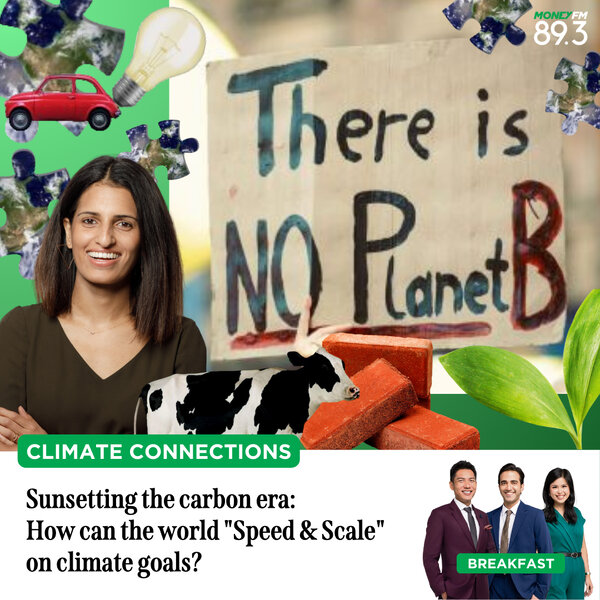
To keep global warming to no more than 1.5°C - as called for in the Paris Agreement - emissions need to be reduced by 45% by 2030 and reach net zero by 2050.
But as the days pass, the world is staring at a growing emissions gap.
Back in 2021, Speed & Scale - a global initiative aimed at pushing leaders to act on the climate crisis - built a plan based on 10 objectives, each with its own set of milestones, or “key results” - to zero out the world’s 59 gigatons of annual greenhouse gas emissions, before it’s too late.
And just recently, Speed & Scale released a global progress report, tracking where the world is making good headway on the road to net zero and where it’s lagging. Most importantly, it points to where we need to go from here in the transition to clean energy, in scaling renewables and cleantech and also in phasing out fossil fuels.
On this episode of Climate Connections, Anjali Grover, Managing Director, Speed & Scale shares more about their blueprint, challenges in tracking some key areas and strategies that can be undertaken to push the world ahead.
Feature produced and edited by: Yeo Kai Ting (ykaiting@sph.com.sg)
Voiced by: Emaad Akhtar
Photo credits: Speed & Scale
Music credits: pixabay & its talented community of contributors
|
|
|
|
12:36
|
AUG 30, 2024
30/08/24 - Climate Connections: Geology of the deep - Singapore at risk with 466 submarine volcanoes lurking at its doorstep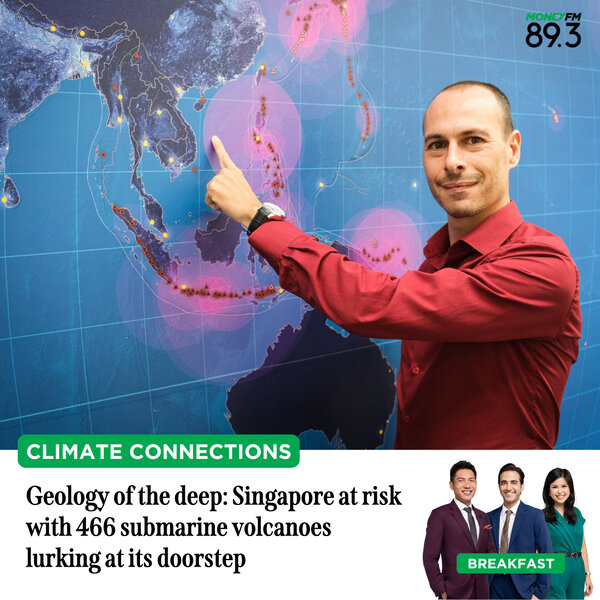
Singapore could be at risk of a tsunami, if an undersea volcano in its neighbouring region erupts.
Globally, tens of thousands of submerged volcanoes lurk beneath the ocean's surface, often going unnoticed and are vastly understudied.
With the help of published data sets and sea-floor topography information, new research has revealed that there are some 466 submarine volcanoes in the waters of Southeast Asia, Taiwan, and the Andaman and Nicobar Islands.
Scientists say in the event of an undersea volcanic eruption, volcanic ash can blow towards Singapore, blanketing the surface with fine ash, similar to an eruption of a land-based volcano. Additionally, lava flows and volcanic rock avalanches can damage undersea cables in the region, causing internet outages and disrupting financial transactions.
On this episode of Climate Connections, Dr Andrea Verolino, Research Fellow from the Earth Observatory of Singapore at NTU elaborates on his study aimed at uncovering the secrets these submarine volcanoes hold within.
Feature produced and edited by: Yeo Kai Ting (ykaiting@sph.com.sg)
Voiced by: Audrey Siek
Photo credits: NTU
Music credits: pixabay & its talented community of contributors & news.com.au
|
|
|
|
14:45
|
AUG 23, 2024
23/08/24 - Climate Connections: Lost At Sea - DNA study of critically endangered hawksbill turtles to reveal their "lost years"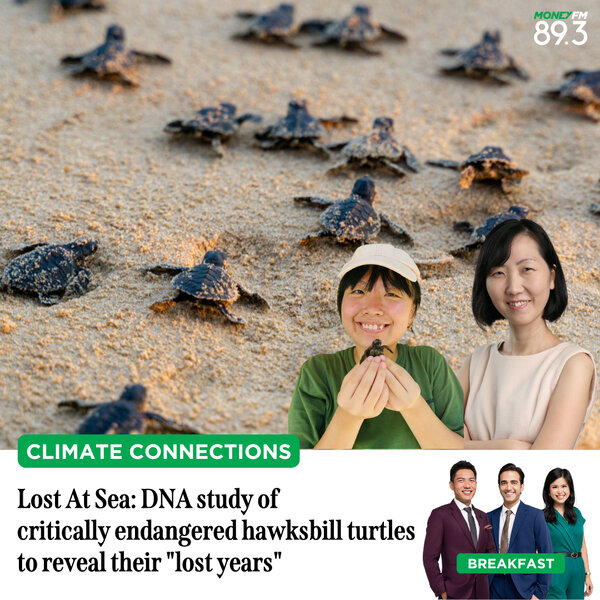
Like other sea turtles, hawksbill turtles are critically endangered due to the loss of nesting and feeding habitats, excessive egg collection, fishery-related mortality, pollution and coastal development.
Currently, hawksbill turtles are protected by international agreements like the Convention on International Trade in Endangered Species of Wild Fauna and Flora (CITES) and the Convention on Migratory Species. This level of international cooperation is essential to the conservation of hawksbills given their wide geographic range.
In Singapore, a small few hawksbill turtles return to the shores during the nesting season between May and October every year. After hatching, these turtles essentially run as quickly as they can to the ocean before a predator can eat them, and then, they are “lost”. Lost, that is, as most would not see them again until they return as juveniles and subadults to their birth shores several years later. That gap of time is called the lost years and has proven to be a challenging life stage to study.
On this episode of Climate Connections, hawksbill turtles researchers Assistant Professor Kim Hie Lim from NTU’s Asian School of the EnvironmentandRegine Tiong, PhD student at NTU share more about their DNA study that’s set to uncover some of the secrets behind lineages of hawksbill turtles that visit Singapore's shores and where they go to nest and forage after hatching.
Feature produced and edited by: Yeo Kai Ting (ykaiting@sph.com.sg)
Voiced by: Emaad Akhtar
Photo credits: Asian Geographic / NTU
Music credits: pixabay & its talented community of contributors & Smithsonian Channel YouTube
|
|
|
|
12:14
|
AUG 16, 2024
16/08/24 - Climate Connections: Separating The Green From Greenwash - Nature Positive Transitions Must Build On Mitigation Hierarchy Applications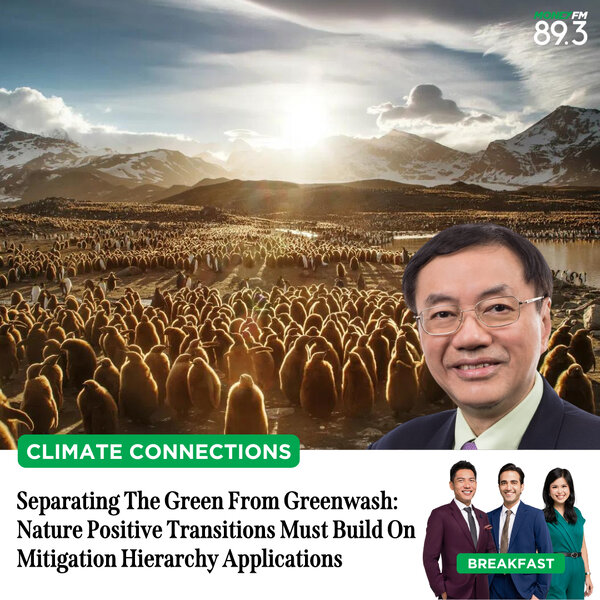
A new environmental movement is gathering pace: “Nature Positive”.
The concept of "Nature Positive" envisages a planet where the current rapid loss of biodiversity is halted and reversed, and nature is restored. Since the term was coined in 2020 amid negotiations for the Global Biodiversity Framework under the Convention on Biological Diversity, world leaders, businesses and civil society have rallied behind the ambition.
With calls for action growing stronger, there’s an increasing recognition that reversing biodiversity is critical for combating the global climate crisis, preventing future pandemics of zoonotic origin, addressing water and food insecurity, as well as supporting sustainable and equitable development. In December 2022, the goal of halting and reversing biodiversity loss by 2030 was codified in the mission of the landmark Kunming-Montreal Global Biodiversity Framework. Its adoption under the UN Convention on Biological Diversity has been described as the ‘Paris moment’ for nature.
However, experts warn that vigilance is needed to prevent the concept of a Nature Positive world being threatened by greenwashing, with some pledges lacking the rigorous scientific framework needed to achieve real impacts.
On this episode of Climate Connections, Professor Lawrence Loh, Director of the Centre for Governance and Sustainability at NUS Business School shares his insights on nature positivity and what companies should consider in order to avoid falling into the greenwashing trap.
Feature produced and edited by: Yeo Kai Ting (ykaiting@sph.com.sg)
Voiced by: Emaad Akhtar
Photo credits: Nature Positive Initiative
Music credits: pixabay & its talented community of contributors
|
|
|
|
14:18
|
AUG 6, 2024
06/08/24 - Climate Connections: An egg farm that gets cracking - one of many local producers working to strengthen Singapore's food future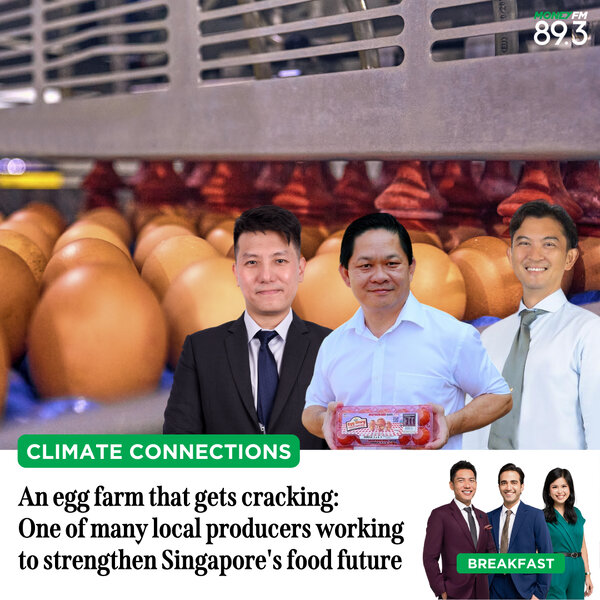
Can Singapore meet its “30 by 30” food sustainability goal?
With the passing of the five-year mark since that goal was set - this question has been cast into the spotlight, following a series of delays, failures or re-configurations of high-tech farms of late.
It hasn’t been easy for local producers, with indoor vegetable farm I.F.F.I shutting down, and VertiVegies abandoning plans to build a mega vertical vegetable farm - both of which had been awarded funding under the government’s 30 by 30 express grant. Other agri-food casualties include aquaculture, with the Barramundi Group ceasing sea bass farming, and novel protein, in particular with the cultivated meat industry seemingly in limbo.
Despite those shake-ups, farmers and relevant stakeholders are still hard at work in pushing the little red dot towards its goal of producing 30% of its nutritional needs locally by 2030.
On this episode of Climate Connections, we explore the issue with a range of stakeholders, including:
- Ma Chin Chew, CEO of N&N Agriculture, a local egg farm that has successfully tapped on technology to scale up its productions, and improve its yield and sustainability.
- Ken Cheong, CEO of Singapore Agro-Food Enterprises Federation (SAFEF), who dives into consumer demand trends, and how SAFEF is working hand-in-hand with local farmers to get their produce on the shelves and stay competitive.
- Andy Chang, Director, Fresh and Frozen, FairPrice Group, who sheds light on what drives consumer choices in today's context, and what local farmers need in order to stay ahead of the game from a retail perspective.
Special thanks to the Ministry of Sustainability and the Environment
Feature produced and edited by: Yeo Kai Ting (ykaiting@sph.com.sg)
Voiced by: Audrey Siek
Photo credits: SFA website
Music credits: pixabay & its talented community of contributors
|
|
|
|
14:09
|







